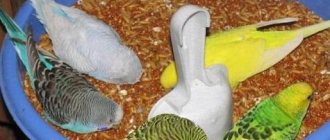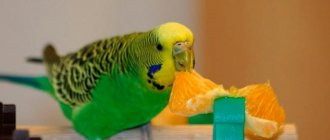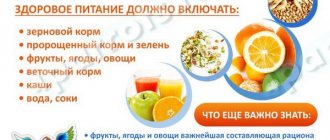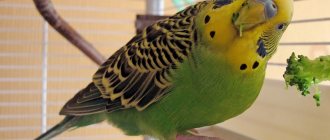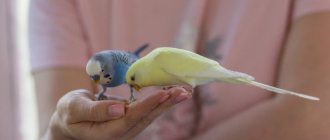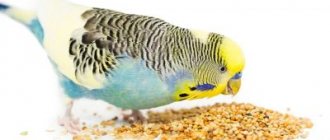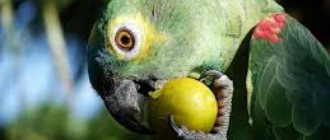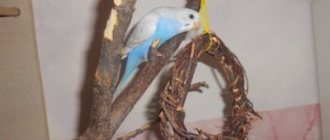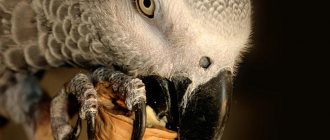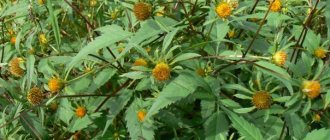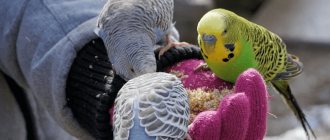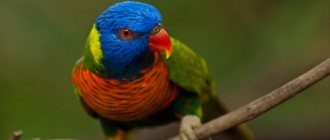The first thing you need to know immediately after you get yourself a parrot is how to feed it properly.
However, it is better to think about this even before purchasing a bird, so that immediately after purchase you can start feeding it correctly, observing an optimal diet.
If you make up your parrot's diet incorrectly, it may not have the best effect on its health and well-being.
On the contrary, if you take care of this and make the bird’s diet varied, healthy and nutritious, then it will be healthy, happy, cheerful and will delight you with its mischievous behavior for a long time.
To understand how to structure a parrot's diet and how to feed it correctly, you need to think about how they feed in their natural habitat.
As a rule, living in natural conditions, parrots feed on seeds of various plants, happily eat tree branches, and are also very fond of all sorts of small spiders and bugs.
However, it is unlikely that you will be able to give your parrot bugs, therefore, you need to think about how to properly feed your parrot so that it feels comfortable in captivity.
Fortunately, modern food for parrots has all possible elements to make the parrot's nutrition optimal and healthy. We suggest you study this in more detail.
- What types of food are there for parrots?
- Proper diet for a parrot
- Cereals for parrots
- Fruits and greens for parrots
- Animal food for parrots
- Ready-made food from specialized stores
- Water for parrots
- Sand for parrots
- How to feed a parrot in winter
What types of food are there for parrots?
Food for parrots can be divided into two main categories - food of animal and plant origin.
As you can guess from the name, plant foods are various seeds, grains, weeds, leaves, vegetables, fruits, tree branches and other exclusively natural foods.
Food of animal origin - various larvae, insects, bugs, as well as chicken eggs and cottage cheese (it is recommended that it be as low-fat as possible).
Actually, these are the most healthy and nutritious foods for your parrot, therefore, you need to try to ensure that each of these products is included in the parrot’s diet from time to time so that its health is strong and the parrot is always in a great mood.
Proper diet for a parrot
If you are the proud owner of a parrot, then you need to take into account that the daily food intake should be approximately 20 grams of food.
By the way, a similar amount of food is recommended for small parrots, for example, budgies and lovebirds. If you have a larger parrot, then it needs about 40-50 grams of food.
In general, one should not assume that this volume is optimal for all parrots, since each case is unique and requires an individual approach, therefore, you can create the correct diet for a parrot only experimentally, that is, by checking how much food it needs and what kind of food it needs. it is the products he prefers.
The amount of food directly depends on a large number of factors, for example, on the air temperature in the room in which the parrot lives.
Of course, if it’s cold in your apartment or house, then the parrot will need much more energy to warm up, and accordingly, it will need more food.
There are quite a lot of such factors, so we advise you to try different variations of products and their volume.
Nut mixes
The grain feed contains nuts. Sometimes their concentration exceeds the needs of the bird. It is recommended to partially remove the nuts so as not to harm the liver. Not all types of nuts are suitable for your pet. For example, you should not offer peanuts: they can be affected by mold, which causes dangerous diseases.
It is necessary to discard fruit seeds:
- bird cherry;
- cherries;
- plums;
- apricot
Bitter almonds are not the best food for parrots. Sweet almonds, pistachios, pecans and macadamia nuts will be much more beneficial.
Cereals for parrots
The most popular food for parrots is ready-made food from various grain crops.
Typically, the following grains are used in such feeds:
- Millet. It is the main component of any food. An essential element required for a balanced diet for a parrot.
- Oats are also considered a very important food product for poultry.
- Sunflower seeds are a source of large amounts of vitamins and microelements.
- And many other grains.
It is worth noting that your parrot may immediately sweep away grain food without even trying other foods. In this case, you should be wary, since eating sunflower seeds in large quantities can lead to metabolic problems - they contain a large amount of oil, which is harmful in large quantities for parrots.
If the parrot ate some seeds and did not touch other grains, then you should not add seeds until he has eaten the rest of the food. Parrots love seeds very much - they are a very tasty treat for them, however, as you know, you can’t eat them too often.
When choosing grain feed, it is necessary to take into account the condition of the oats, since they can be peeled or unpeeled. Of course, it is best to give your parrot unshelled grains, since the shells allow the grains to retain the greatest amount of nutrients and microelements necessary for the good health of the parrot.
In addition, thanks to this, the parrot will have an additional activity, since he will have to clean the grains on his own, and physical activity will obviously not be superfluous for him.
Sprouted grains are also considered an integral part of a parrot's diet, as they are particularly rich in various beneficial substances that are not found in other seeds and grains.
It is recommended to give sprouted grains in the winter, when the parrot especially needs additional vitamins that strengthen its immune system.
It is enough just to place a small amount of grains in a container with hot water, and in about an hour and a half they will germinate, therefore, they can be given to the parrot.
It is necessary to understand that sprouted grains spoil much faster than regular grains, therefore, you need to give them in small portions so that the parrot has time to eat them before they spoil.
If you notice that the parrot eats them slowly, then you must remove them from the cage over a certain period of time.
Porridge
Porridges for budgies and lovebirds are prepared from the same ground grains, for example, millet or corn flour; oatmeal and rice flakes are also consumed with great enthusiasm.
Porridges are cooked in water; milk and any dairy products, with the exception of cottage cheese, kefir, yogurt and fermented baked milk, should be excluded from the bird’s diet. Also, the porridge is not salted or sugar or any other ingredients besides water and flour are added to it, therefore the product that is prepared by a person for his own consumption is not suitable.
Fruits and greens for parrots
Vegetables, fruits and herbs are useful not only for humans, but also for the parrot. Everyone knows that these products are rich in various vitamins, minerals and other beneficial microelements that will benefit the body of your feathered pet.
This is especially true in cases where the health and immunity of the parrot may deteriorate, for example, in winter.
It is recommended to give the parrot cabbage leaves, apples, carrots, pumpkin, strawberries, pears, plums, kiwi, mangoes and many other fruits, berries, vegetables and herbs. This is not only useful for providing adequate nutrition to the parrot and strengthening its health, but also for diversifying its diet.
He definitely won’t be sad if you feed him well with fresh fruits and vegetables, as parrots love them very much. You can also include various plants in your parrot's diet, for example, lettuce, parsley, young nettles, dill, sorrel, dandelions and other plants. In their natural habitat, parrots prefer plants, as they form the bulk of their diet.
Of course, it is recommended to give your parrot fruits, vegetables, herbs and berries grown exclusively naturally without the use of various chemicals, since pesticides and other elements can cause irreparable harm to the parrot’s health.
That is why, if you have suspicions that high-quality fruits and vegetables cannot be bought, then you should not risk feeding them to your parrot.
In small quantities they will not cause harm, but if you constantly include such products in your parrot’s diet, this can lead to adverse consequences.
Vegetables
Vegetables are no less useful. The daily menu of an adult lovebird should contain no less vegetables than fruits. Many birds simply love:
Fresh carrots (the tops don’t need to be torn off, the birds eat them too, not disdaining even slightly dried greens.
Sweet and even hot peppers are eaten together with the seeds, the main thing is to make sure that the vegetable is well washed and does not contain signs of disease (mold, black spots, rot).
Tomatoes and cucumbers.
Rutabagas, turnips and turnips are pre-blanched.
Squash, pumpkin, squash and zucchini can be given directly with the seeds.
Beetroot and beet tops.
Brussels sprouts and kohlrabi, scalded with hot water.
Celery, green peas and beans in pods (need to be blanched).
Broccoli and cauliflower (vegetables are kept in boiling water for 3-5 minutes).
The lovebird parrot will not refuse a fresh ear of corn, especially sweet sugar varieties. Half the average size of an ear of cob per day is enough to satiate. At the same time, corn can be used not only for satiation, but also for games, entertainment is guaranteed for both it and the owner.
In the summer, the parrot is fed leaves of young nettles, spinach, lettuce, honey and plantain. Greens contain all the vitamins a bird needs; the main thing is to collect it correctly. It is advisable to do this away from roads and any sources of dust pollution. Before distribution, the leaves are treated in hot water and crushed. You can add greens to porridge or grain mixture.
Animal food for parrots
A balanced diet is impossible without animal protein, since it is necessary for normal life, if not for all, then at least for most living beings, including people and parrots.
As a rule, parrots are fed boiled chicken eggs and cottage cheese, since these products contain a minimum of harmful substances and a maximum amount of healthy animal proteins.
The ideal option is a chicken egg grated with carrots, beets or any other vegetables or herbs, as this fills the egg with useful substances and makes it as nutritious as possible.
Be sure to ensure that the products are not expired, so as not to harm the health of the parrot. All products must be fresh.
Minerals
Artificial vitamins and minerals are fed approximately once a quarter. The course of treatment is 2 weeks. The ideal mineral supplement of natural origin is considered to be sepia or cuttlefish shell, which is left in the cage until it is completely crushed by the bird. If a budgerigar consumes sepia, then it does not need additional supplements containing calcium, but it is impossible to completely abandon vitamins. For example, for better absorption of the substances contained in the shell, vitamin D is needed, as well as an amino acid. Amino acids are found in cereals. Most of them are found in buckwheat, wheat, wild rice and oats, and legumes. Calcium is found in spinach and beet tops.
Some owners, in their desire to maintain the health of lovebirds at the proper level, oversaturate the bird’s body with fish oil containing vitamins A, D, E. But a large amount of seemingly necessary substances can be harmful.
Ready-made food from specialized stores
If you don’t have much time to care for your parrot, then there is an excellent alternative - ready-made food for parrots, which takes into account all their preferences and needs.
As a rule, such food consists of cereals and tree branches, but quite often you can also find other elements in them, for example, crackers and many other tasty treats.
When buying ready-made food for your parrot, pay attention to the production date and expiration date so as not to purchase an expired product. It is recommended to avoid those foods that contain dyes and other harmful additives.
Do not skimp on your parrot, as poor food can cause irreparable harm to its health.
To do this, simply study the main assortment of the pet store or simply consult with the seller so that he can tell you the optimal food, which takes into account all the recommendations.
Ideally, of course, feed your parrot homemade food, since in this case its diet will be as balanced as possible and you will be confident in the quality of the food.
What to feed the chicks
Babies that have recently hatched from eggs are completely helpless. They need parental care. The female feeds the newborns with crop milk, which consists of partially digested grain. If the female abandons her children or dies, the breeder has to take on the role of mother and decide what to feed the chicks.
The most convenient option is to buy ready-made food for small parrots, for example, NutriBird A19 mixture. The powder should be diluted to a thickness that suits the chick. Babies should be fed every two hours, gradually increasing the time between feedings to four hours. Hungry chicks themselves will demand food, calling invitingly at the sight of the owner.
Water for parrots
By studying the materials published on our website, you may have already learned about what a drinker is, what it is needed for and how to choose it correctly. Water is essential for parrots, as for all other living creatures on our planet.
You can install a saucer of water in a parrot's cage, but this option is considered far from the most convenient, since the parrot can easily turn it over and water will splash throughout the cage.
If you are not at home at this time, then the parrot will have to sit without water all day, and, as you understand, there is little benefit in this. It is much better to install a comfortable drinking bowl, which is recommended to be filled with filtered water.
Boiled water can be used, but is not recommended, since it contains very little oxygen and other useful elements. By the way, feeding a parrot with raw tap water is strictly prohibited!
You can buy water for your parrot in the store, but it will be much more profitable to simply install a water filter - this is not only more profitable from a financial point of view, but will also be useful for you, since clean water is useful not only for parrots, but also for people.
